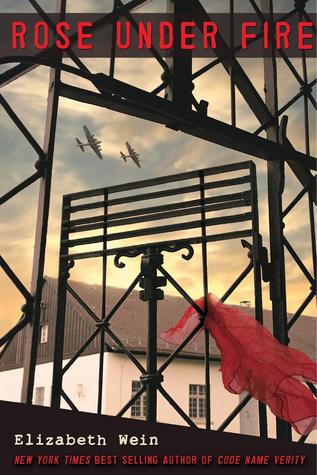
Elizabeth Wein became a household name around the bookstore where I work in 2012 when her first book, Code Name Verity, hit shelves. Our staff loved it, and it went on to win a Printz award. So with the author's accolades piling up I sat down to read her second book, Rose Under Fire.
While Rose's story is not at all related to the characters or events that take place in Code Name Verity, it's the second of what's being called the "Young Pilots Series." Rose is a pilot for the Air Transport Auxiliary during WWII, a teenage girl from Pennsylvania who loves the excitement of transporting planes in Europe but is eager for the war to end. One afternoon while flying back from a mission, she is captured by German pilots and taken to Ravensbrück, the infamous women's concentration camp in Germany. There, in order to survive she forms incredible bonds with women from all over Europe to survive under unthinkable circumstances, and eventually to escape as the war draws to a close. It's a harrowing tale of desperation and the evil but also the resilience of the human spirit.
The book is written in the form of a journal that begins well before Rose is near any danger. She describes her life as an ATA pilot and the people she knows, from her wealthy family to her friends and the soldier she dates when he's not abroad. Then she disappears suddenly on her way back to camp from her last mission, accidentally leaving her journal behind her. It's returned to a friend of hers, along with the rest of her personal effects, under the assumption that Rose is dead. The friend writes a few entries, which is what tells the reader that Rose is missing but that all hope is not lost. The war ends, soldiers come home, and tales of the horrors at places like Auschwitz and Dachau begin to surface. Finally we hear once again from Rose. From a hotel room in Paris she tells us, haltingly, the story of what happened to her after her capture.
Characters were mainly what drove this book, pushed together and pulled apart by the ebb and flow of war as it drew to a close and the Nazis began to succumb to desperation. Wein's vivid descriptions of the Polish women who underwent medical experimentation, of the wild Russian fighter pilot, of serene French matrons and the German criminals who were put in charge of other prisoners paint a brilliant tapestry of humanity, then white-wash it all with the hopeless colorlessness of war.
While interesting and emotional, I didn't feel that Rose Under Fire was nearly as cohesive a story as Code Name Verity was. It felt as though bits and pieces had just been stuck onto the beginning and the end of the main story (Roses's survival at Ravensbrück) in order to include more volume. While it's true that the "before" and "after" portions helped to provide perspective on Rose's ordeal, and the "after" portion provided some important closure, they made the story's main focus unclear as it shifted. Personally, I think that the story would have been more effective if the beginning up until Rose's last mission were omitted entirely. Removing the multiple instances of meandering that were nonessential to the story and to Rose's post-war relationships would have streamlined the story after her return from Ravensbrück as well.
My overall feeling about Rose Under Fire is that while it certainly has its merits, the story went in too many directions and tried to include too many interesting asides to be completely effective. The third installment of the Young Pilots Series, entitled Black Dove, White Raven will be released in March. Both Code Name Verity and Rose Under Fire are available now through your favorite local independent bookstore.
No comments:
Post a Comment